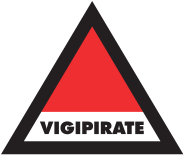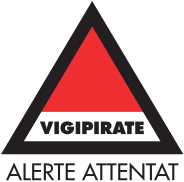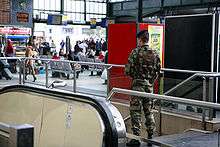Vigipirate

Vigipirate (French: Plan Vigipirate) is France's national security alert system. Created in 1978 by President Valéry Giscard d'Estaing, it has since been updated three times: in 1995 (following a terror bombing campaign), 2000 and 2004
Until 2014 the system defined four levels of threats represented by five colors: white, yellow, orange, red, scarlet. The levels called for specific security measures, including increased police or police/military mixed patrols in subways, train stations and other vulnerable locations.
In February 2014 the levels were simplified to 'vigilance' and 'attack alert'.[1]
The name "Vigipirate" is an acronym of vigilance et protection des installations contre les risques d'attentats terroriste à l'explosif ("vigilance and protection of installations against the risk of terrorist bombings")
Levels of alert (to 2014)

| Alert level | Color | Significance | Measures taken |
|---|---|---|---|
| White | No danger | No danger | |
| Yellow | Vague threat / raise vigilance | Raise security levels to face real yet still uncertain dangers, through measures that are local and minimally disruptive of normal activity, while preparing to switch to "orange" or "red" within a few days. | |
| Orange | Possible threat / prevent terrorist action | Take measures against plausible risks of terrorist action, including the use of means that are moderately disruptive to normal public activities, while preparing to switch to "red" or "scarlet" on short notice where possible. | |
| Red | High chance of threat / prevent serious attack | Take measures against a proven risk of one or more terrorist actions, including measures to protect public institutions and putting in place appropriate means for rescue and response, authorizing a significant level of disruption to social and economic activity. | |
| Scarlet | Definite threat / prevent major attack | Notification of a risk of major attacks, simultaneous or otherwise, using non-conventional means and causing major devastation; preparing appropriate means of rescue and response, measures that are highly disruptive to public life are authorized. | |
Levels of alert (from 2014)


- Vigilance
- Attack alert
History of alert levels

| Date | Level | Description |
|---|---|---|
| 2 January 1991 | Phase 1 | First release phase 1 in the beginning of the Gulf War. |
| 17 January 1991 | Phase 2 | Passage of phase 2 in the early war strikes. |
| 26 April 1991 | Lifting of level | |
| 8 September 1995 | Release | After the 1995 Paris Métro and RER bombings. |
| 15 January 1996 | Relief | |
| October 1996 | Suspension | |
| 3 December 1996 | Reactivation | After an attack on the RER station Port Royal in Paris. |
| 1998 | Reinforcement | Due to the 1998 FIFA World Cup. |
| 24 April 1999 | Reinforcement | Due to the Kosovo War. |
| 24 April 1999 | Reactivation | In the wake of the attacks in Corsica. |
| 27 December 1999 | Reactivation | In the wake of the Y2K problem. |
| 11 September 2001 | Reinforcement | After the September 11 attacks in the United States. |
| 5 June 2002 | Prorogation | Prorogued by the new Prime Minister Jean-Pierre Raffarin. |
| 9 September 2002 | Prorogation | Extension of Vigipirate strengthened after the September 11 attacks. |
| 6 December 2002 | Reinforcement | Celebrations at the end of the year. |
| 20 March 2003 | Reinforcement | At the beginning of the Iraq War. |
| 20 March 2003 | Orange level | Reforming of Vigipirate and the introduction of color levels due to the Iraq war. |
| 17 May 2003 | Orange level | After the 2003 Casablanca bombings. |
| 2 October 2003 | Yellow level | Prime Ministerial decision. |
| 1 December 2003 | Orange level | Due to the celebrations. |
| 26 January 2004 | Yellow level | |
| 12 March 2004 | Red level | Only in land transport, orange everywhere else. After the 2004 Madrid train bombings. |
| 24 May 2004 | Red level | During the week-long anniversary of the invasion of Normandy. |
| 8 June 2004 | Orange level | |
| 8 July 2004 | Orange level | |
| 7 July 2005 | Red level | After the 7 July 2005 London bombings. |
| 10 October 2005 | Red level | New measures adopted. |
| 8 November 2005 | State of emergency | State of emergency implemented due to the 2005 French riots. |
| 4 January 2006 | Red level | End of the state of emergency. |
| July 2006 | Red level | New measures adopted. |
| 16 December 2008 | Red level | After explosives are found at a Paris department store. |
| August 2010 | Red level | Measures of protection are reinforced. |
| September 2010 | Red level | Strengthening of security throughout the country. |
| November 2010 | Red level | After five terror suspects are arrested. |
| May 2011 | Red level | After the death of Osama Bin Laden. |
| 19 March 2012 | Scarlet level | After the Toulouse and Montauban shootings. First time scarlet level is implemented. |
| 24 March 2012 | Red level | Level lowered back to red after the Toulouse and Montauban shootings suspect was apprehended. |
| 20 February 2014 | Vigilance | Level set to "Vigilance" with the inauguration of the updated Vigipirate threat levels. |
| 7 January 2015 | Attack alert | Alert level raised in Île-de-France, and in the Picardy region the following day, after the Charlie Hebdo shooting. The alert level was lowered back to Vigilance in Picardy on the 14 January 2015, while being maintained at the Attack level in Île de France. |
See also
| Wikimedia Commons has media related to Vigipirate. |
- States of emergency in France
- UK Threat Levels, used in the United Kingdom, replacing the BIKINI state in 2006
- Homeland Security Advisory System (United States)